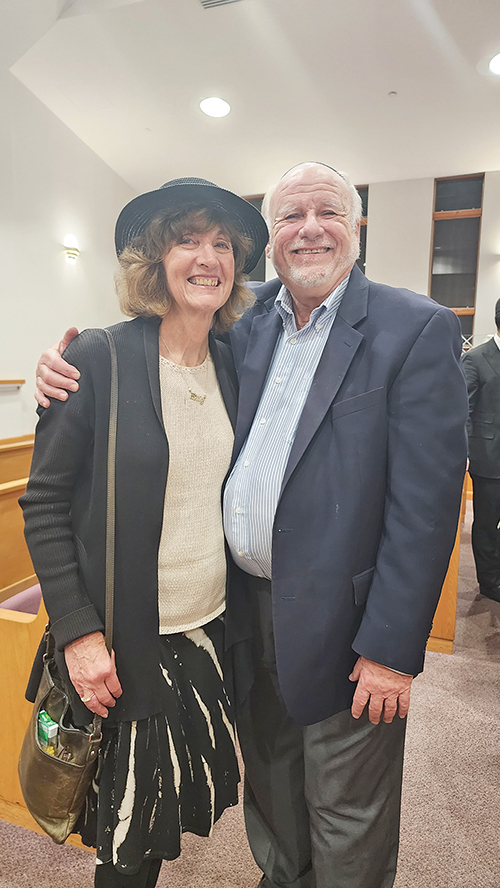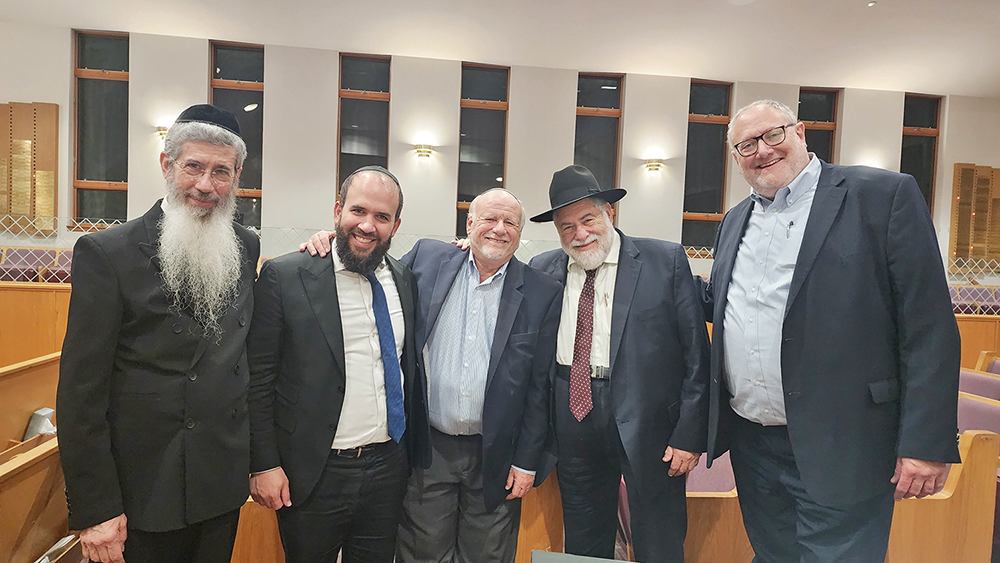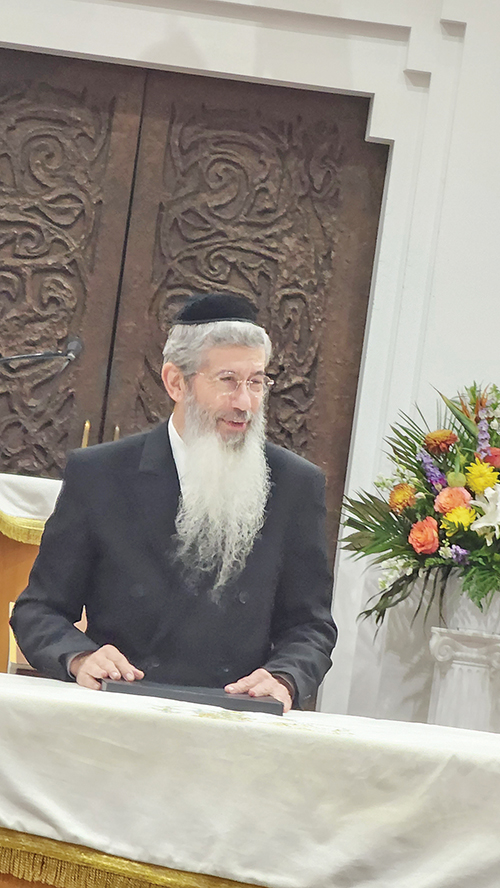
Nearly 75 people came from near and far to hear Rabbi Dovid Goldwasser, a prominent Torah personality, syndicated columnist, daily radio commentator and acclaimed speaker, known for his exceptional ability to captivate and inspire audiences worldwide, give a special Aseret Yemei Teshuva lecture at the Young Israel of East Brunswick (YIEB). Also in attendance were Rabbi Yaakov Wasser, rabbi emeritus of YIEB; Rabbi Yaakov Tesser of the Young Israel of Aberdeen; and Nachum Segal of the Nachum Segal Network.
This is the second year that Rabbi Goldwasser has come to YIEB under the sponsorship of Bea and Ralph Rosenbaum. According to Bea, “His message was so well received by the community. Everybody loved the speaker, so we agreed to sponsor him again.” Ralph added, “Bea and I are very proud that Rabbi Goldwasser is making his second appearance at YIEB.”
Seena Eisenman’s late husband had hosted Rabbi Goldwasser several times at their home in Florida and she couldn’t miss the opportunity to attend this event while visiting family in New York. “I listen to him on the radio and am so impressed with his wisdom, graciousness and demeanor. If I can’t catch his divrei Torah live on the air, I visit the archives,” she said.
David Falk of East Brunswick came with his daughter, Adina, explaining, “It seemed a great opportunity to be inspired—and spend some time with my daughter.”

Rabbi Goldwasser began his presentation describing the greatness of Yom Kippur. No matter what sins a person has committed, Hashem grants them unconditional amnesty for whatever they had done. “The door is open for teshuva (repentance) for everyone,” he said.
The first story Rabbi Goldwasser told was that of a man who was standing near the cash register as he was picking up some food at a restaurant. Asking to speak privately outside, the man said that he wanted to do teshuva for stealing something. Rabbi Goldwasser told him that he should confess by saying Viddui, sincerely repent, and return what he stole. The man asked what he should do if he didn’t remember everyone he stole from, and was told that the Talmud says the item could be given to an institution. The man then asked if the return had to be done in person, which could be embarrassing. “No, the return can even be done by mail. Hashem removes all obstacles and makes it easy to do repentance,” said the rabbi.
“The key is to do repentance and pray with the proper intent. The example was given of High Priests who went into the Holy of Holies at the Beit Hamikdash to pray for the nation of Israel on Yom Kippur. If the prayers were said without the proper mindset, the High Priest was struck dead. Yom Kippur is a signal to ‘get things right and help us move into the year to do the right things,’” added Rabbi Goldwasser.
Another story was told of a rabbi who was learning about Gilgulim when a robber snuck into his house through the chimney. Seeing the person covered in soot, the rabbi thought the man was a lost soul who had sinned and was seeking repentance. “What are you looking for?” asked the rabbi. “I need advice on how to get out of here,” was the reply. The answer was, “You came here of your own volition, why do you need help to get out? Go the way you came.” The meaning of this story is that a person can get involved with a bad habit, but they have to do repentance in their own way and learn a new pattern of goodness in order to get forgiveness. “Hashem will give each person asking for sincere forgiveness the path to teshuva,” explained Rabbi Goldwasser.
Rabbi Goldwasser continued by stating that on Yom Kippur a person is like a new baby. They are a person who is completely innocent and with no sins, but they must honestly confess that they will try to be a better person in the future. “Even if a person only adopts one mitzvah, or even just one for a short period of time, a small acceptance of a mitzvah can help in a huge way,” said the rabbi.

After several other inspirational stories focusing on the opportunities to do teshuva, Rabbi Goldwasser concluded with a story about forgiveness. While in Brighton Beach in Brooklyn performing the mitzvah of bikur cholim, he came across a distraught woman walking with her niece. Apparently, someone just said something horrible to her and she was understandably upset. The woman was an “older single” and felt that she was an awful human being, and based on the woman’s cruel remarks was undeserving of a spouse or any happiness. Knowing the many good deeds the single woman performed, Rabbi Goldwasser reassured her that she was indeed a good person and that while it would be a challenge, she should not only try to forgive the person who said the cruel remarks but should even give that person a blessing. In the merit of the blessing and the forgiveness, the older single should only have a future of good things.
At davening later that day, Rabbi Goldwasser prayed for a husband for this woman. Sure enough, the older single called Rabbi Goldwasser about six months later to tell him that she was seeing someone and things seemed to be very positive.
Rabbi Goldwasser concluded with the thought that no one should ever give up hope. No matter how grim things look, every person should open their eyes to look behind the bad to see the good. “It is the understanding of the importance of these challenges that permeate the 10 days of repentance and bring us moving to Yom Kippur.”
The presentation concluded with Rabbi Goldwasser’s wishes that everyone in attendance be inscribed for a good year and it should be the “best year ever.”
Rabbi Goldwasser’s Torah insights and inspirational stories of faith and encouragement are available by downloading the Nachum Segal app. For those in the East Brunswick area who are “technically challenged,” Ralph Rosenbaum invites them to ask him for assistance so they can hear Rabbi Goldwasser and experience the inspiration daily.
Deborah Melman is a staff writer at The Jewish Link.












